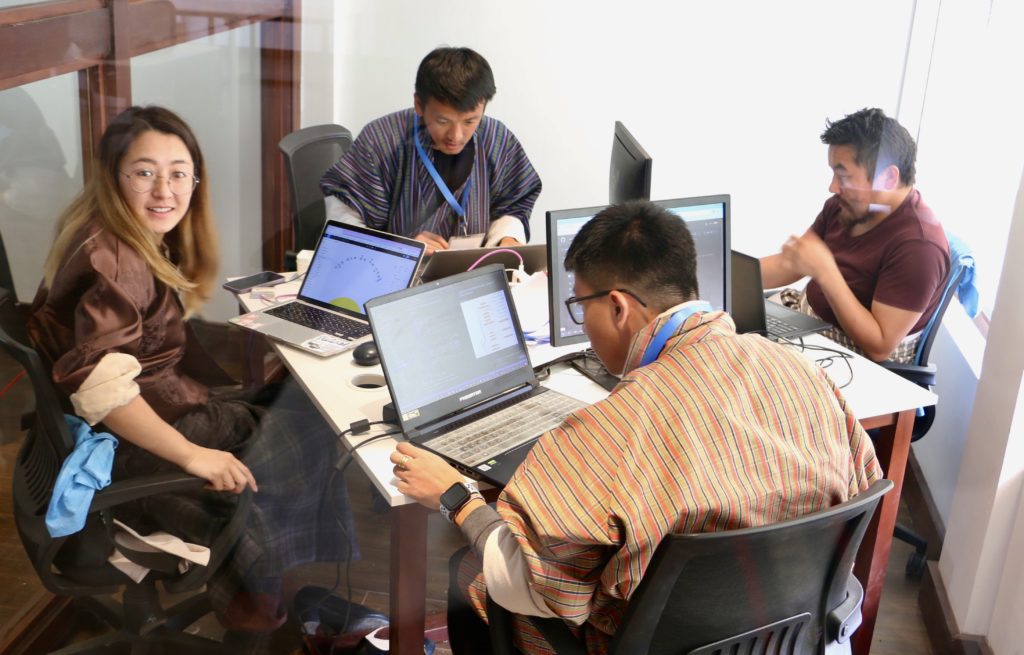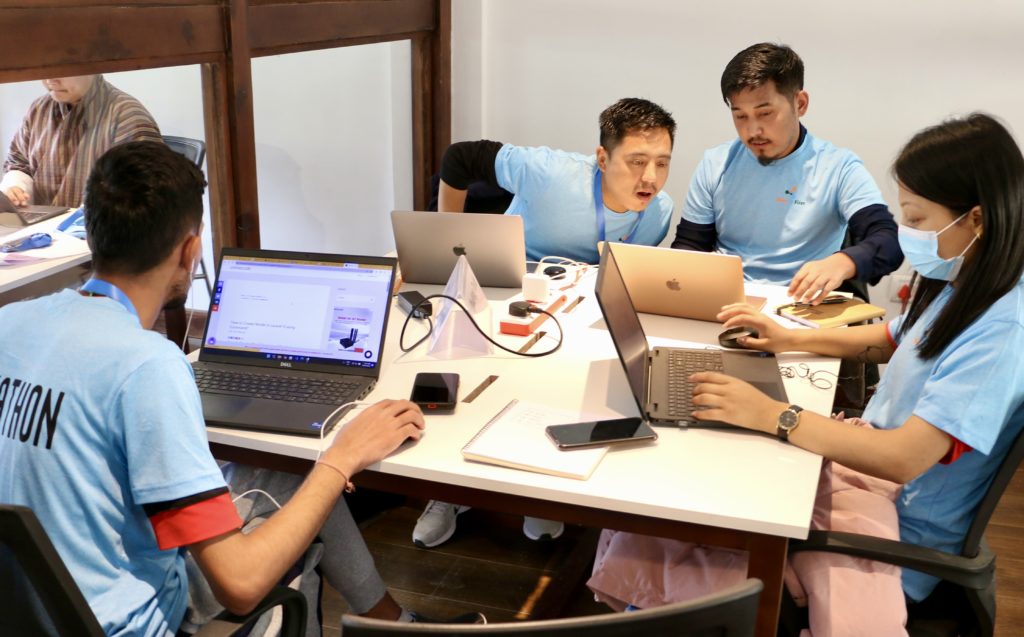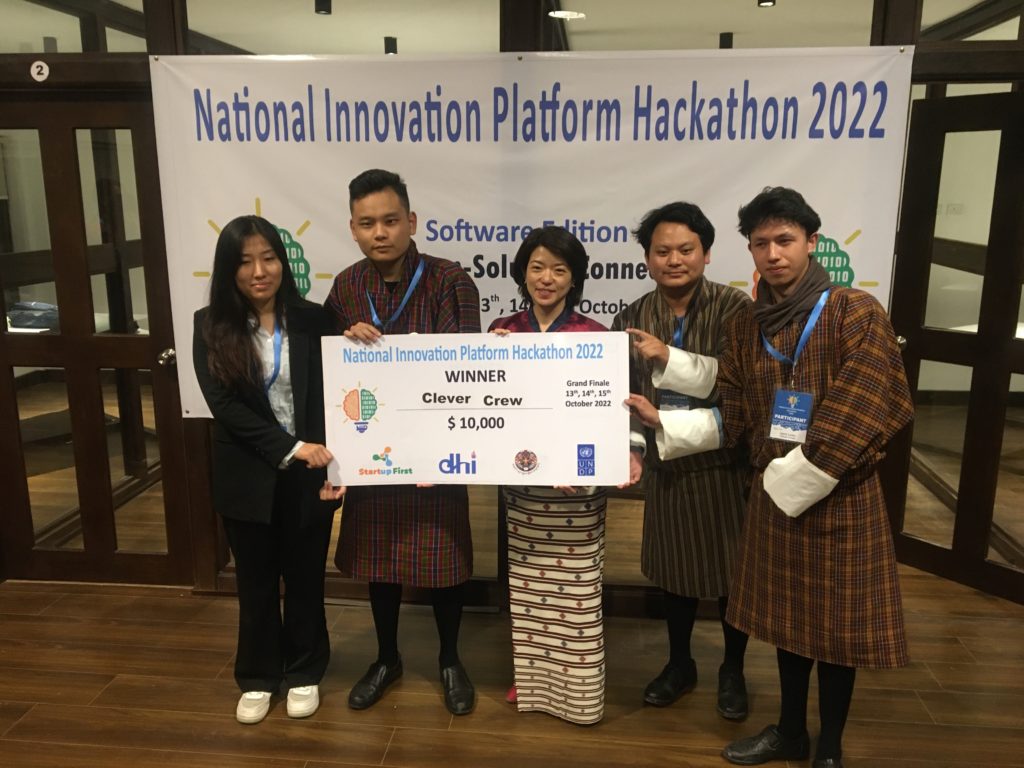CEFE was in Bhutan in 2004 but lost focus due to organisational management changes. It got revived in 2014 with fund support from UNIDO and with technical support from CEFE Net Sri Lanka.
CEFE was re-introduced as it has a curriculum and standard delivery methodology. CEFE Bhutan took the lead in implementing CEFE activities to make a more robust presence. Currently, Startup First is leading CEFE Bhutan as core activities. The National Entrepreneurship Strategy Development was implemented to revitalise entrepreneurship promotion in Bhutan and take stock of entrepreneurship and business activities in 2013. The document came up with five strategies:
- 1. Optimising the regulatory environment
- 2. Enhancing entrepreneurship education and skill development
- 3. Facilitating technology exchange and innovation
- 4. Improving access to finance
- 5. Promoting awareness and networks

Critically we found out that capacity building is fragile and prioritised to implement as the first activity to bring the quality of the entrepreneurship program since 2014. Entrepreneurship curriculum developed and implemented in TVET and Colleges. TVET institutes and Colleges focused on training of trainers as most youths come from these institutes. Financial institutes also included training of trainers, as they are the ones who are funding the projects.
In 2015 two significant activities took place. Firstly, outreaching entrepreneurship programs from the Trongsa district, where the first heredity Monarchy of Bhutan started. Initially, all the entrepreneurship programs were conducted in the Thimphu capital. Many rural-urban migrations took place, and the entrepreneurship aspiring entrepreneurs had to travel from far-flung places risking their life and time. Now entrepreneurship programs happen in all 20 districts of Bhutan. Secondly, to bring more vibrant and innovation to entrepreneurship, ´´Startup Weekend´´ started with technical support from Techstars and QED. More than 15 events have been implemented in tourism, technology, and agriculture.
In 2018 a powerful climax of Entrepreneurship arose due to the impact of the Startup Weekend program that brought the limelight of the Startup Flagship program for entrepreneurship for the 12th Five Plan of the Royal Government of Bhutan. Until then, incubation has not existed in Bhutan to nurture the idea. Ten incubation centres along 10 Fablabs were proposed to implement in TVET institutes and Colleges and to make robust innovations. Both incubation centres and Fablab co-exist as it has interlinked support in the ideation stage.
Currently, we have 5 College incubation centres, one standard Fablab at TVET institute, one BIO Fablab in one College of Natural Resources, one Super Fablab at Royal College, and one Super Fablab in Thimphu Techpark. Additional incubation as a Startup Centre by the Ministry of Economic Affairs and Impact Hub incubation centre has been established by innovating Bhutan of Youth Development Fund.

Moreover, the students can pursue their ideas once they graduate from the schools as self-employment. Sixty high schools have their Student Business Seedling club to nurture their ideas with dedicated seed funds. Furthermore, Hackathons are implemented to solve problems of the business and corporate entities. We had been doing both open and closed-ended hackathon programs for agencies.
Recently National Innovation Platform Hackathon 2022 was conducted for the organizers – UNDP Bhutan, Ministry of Economic Affairs, and DHI InnoTech. The web portal is developed to match the person who has the idea and can give a solution to the problem from 13-15 October 2022. In line with this, UNICEF has come up to support online. Mentoring hackathon web portal development to connect mentors and mentees will be from 9-11 November 2022.

The point of attention in terms of support provided to the entrepreneurs in Bhutan is a matter of replication efforts. Many of the agency’s focus on offering help to entrepreneurs at the initial stages of an idea or start-up and early in their entrepreneurial journey, while there is little support from any agencies for entrepreneurs who have crossed these initial stages. Consequently, there is a need for support efforts for entrepreneurs who crossed the initial stages. Almost 70% of start-ups do not cross three years of their first phase of business life. This is where Startup First focuses on the priority area to have at least a 50% success rate by 3rd year.
Many agencies like the Department of Industry of the Ministry of Economic Affairs came up to support the entrepreneurs like Industrial Estate zones in the districts Samtse, Gelephu, Samdrup Jongkhar, Mongar, Tsirang and Thimphu. These agencies mainly provide land, electricity, and water. It offers special fiscal incentives. These places have better market reach from within the border with neighbouring India. Loden Foundation ( www.loden.org ) is an NGO that support entrepreneurs with funding. Loden does support Festival of Entrepreneurs in October in place of Global Entrepreneurship Week in November in collaboration with national and international supporting agencies.
Startup First is CEFE Bhutan’s first training institute dedicated to innovation and entrepreneurship development. The institute is primarily engaged in training to promote business ideas, creativity, and the start-up ecosystem in Bhutan. Startup First is also involved in research and providing consulting support to Teenpreneurs. The institute offers capacity development courses for start-up ecosystem players – enablers, innovators, and investors in collaboration with government, academia, and industry. The classes are delivered using immersive learning pedagogy -CEFE and Lean Startup methodology.
